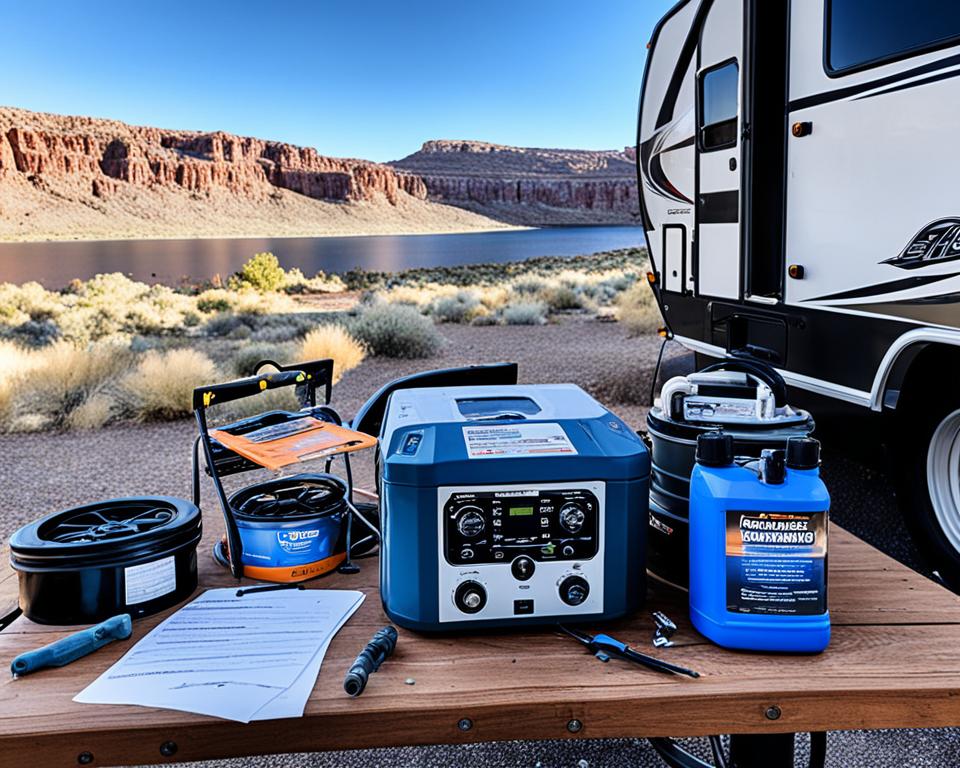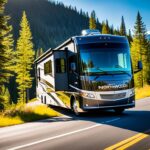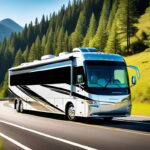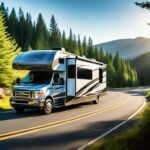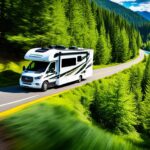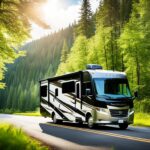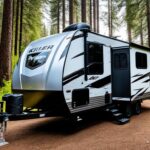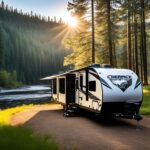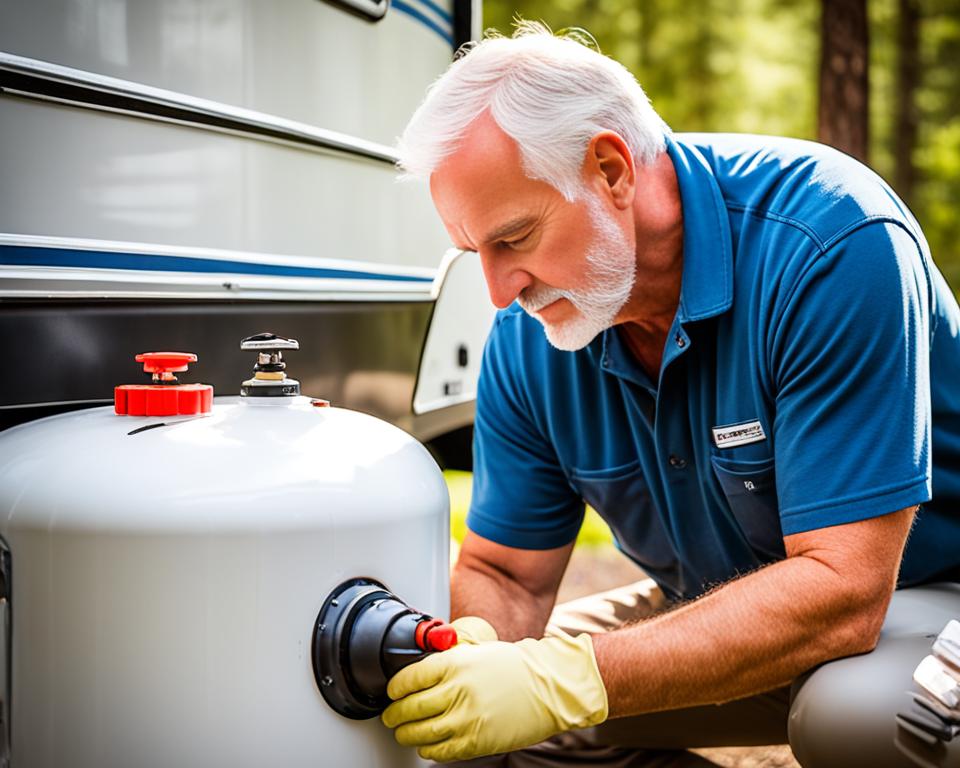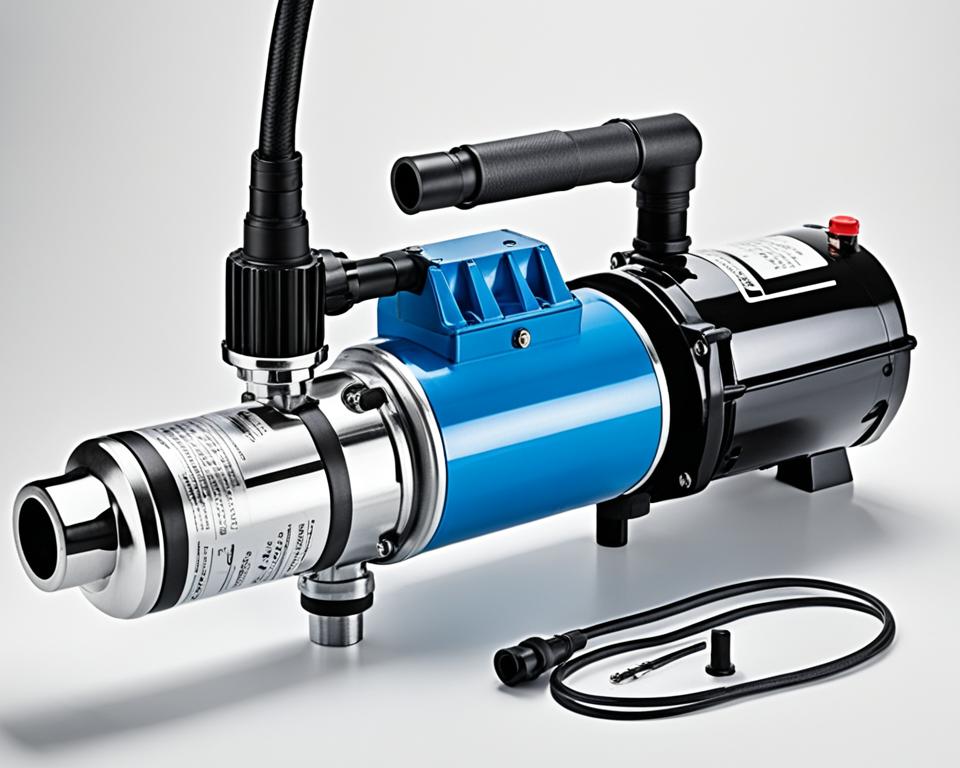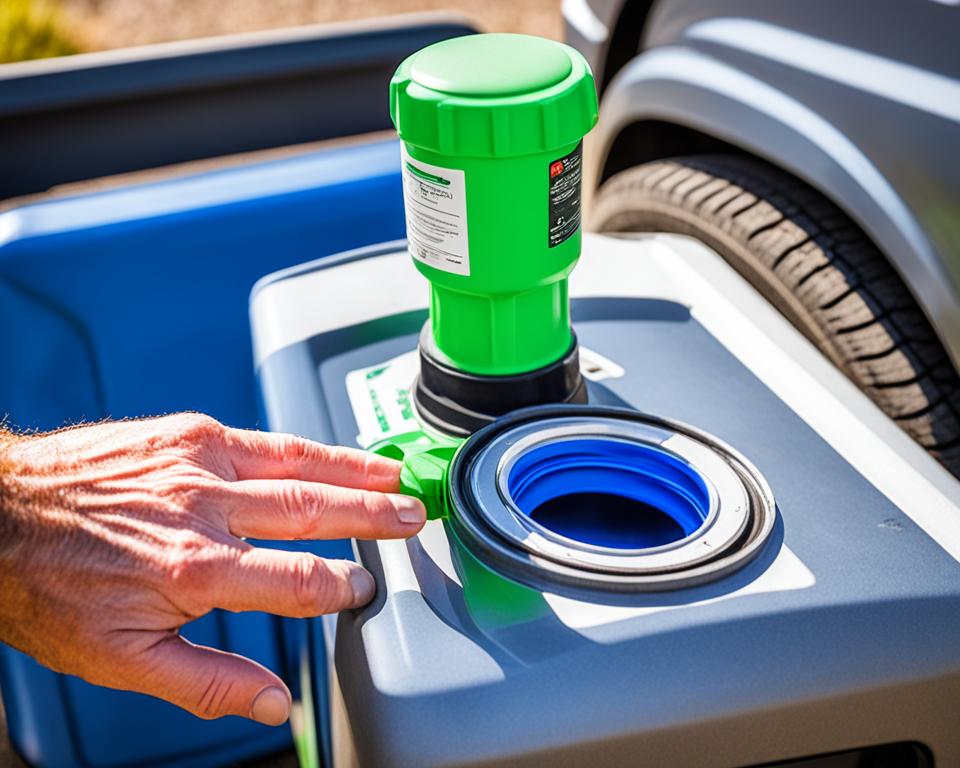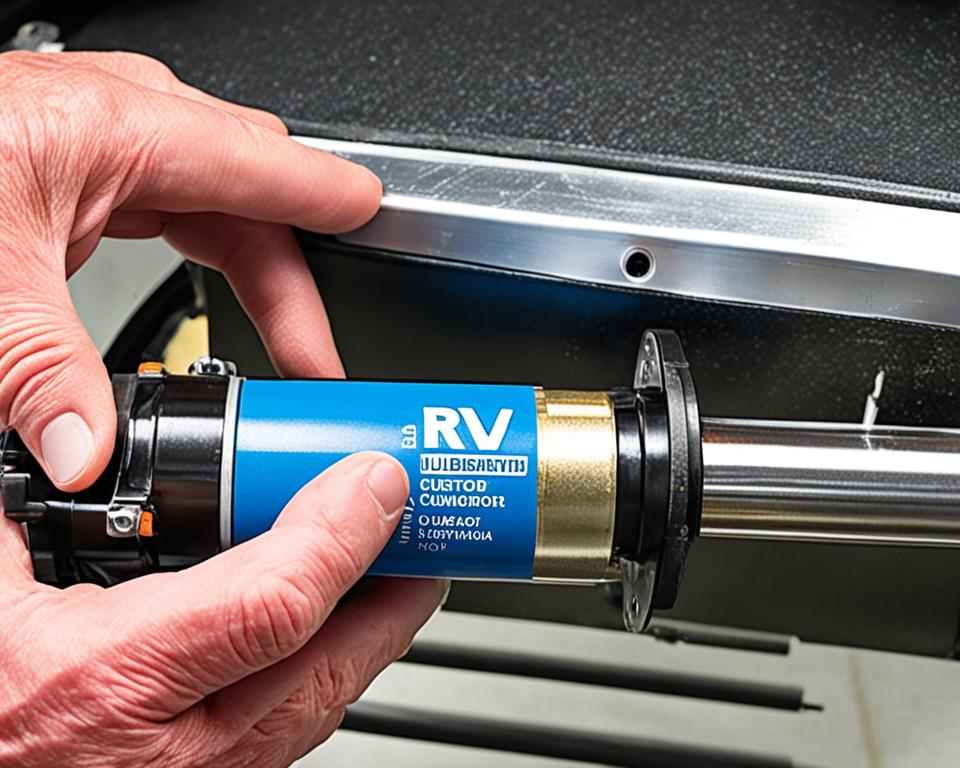Taking good care of your RV generator is crucial for ensuring its peak performance and longevity. Routine maintenance tasks and essential tips can keep your generator running smoothly, providing power for all your adventures. In this article, we will provide you with the best RV generator maintenance practices to help you maintain your generator effectively.
Key Takeaways:
- Regular RV generator maintenance is essential for optimal performance and longevity.
- Follow a checklist to ensure you cover all necessary maintenance tasks.
- Proper maintenance helps prevent breakdowns and costly repairs.
- Perform routine inspections and maintenance to spot and address any issues early.
- Consult your RV generator’s manual for specific maintenance guidelines.
Importance of RV Generator Maintenance
Proper maintenance of your RV generator is essential for several reasons. Regular maintenance helps to prevent breakdowns and costly repairs, extends the lifespan of your generator, ensures optimal performance, and keeps your adventures powered up. By following a comprehensive maintenance routine, you can avoid unexpected issues and maximize the efficiency of your RV generator.
Top RV Generator Maintenance Tips
Here are some top tips to incorporate into your RV generator maintenance routine:
- Regularly check and change the oil to keep the engine lubricated and running smoothly.
- Inspect the air filter and clean or replace it as necessary to maintain proper airflow.
- Check the fuel filter and replace it if clogged or dirty to ensure a steady fuel supply.
- Test the battery regularly and keep it clean and charged to avoid starting issues.
- Inspect the spark plugs and replace them if worn or damaged for efficient ignition.
- Clean the generator’s exterior and remove any debris or dust that may hinder its performance.
- Use fuel stabilizer to prevent fuel from deteriorating during storage periods.
- Inspect the exhaust system for leaks or damage and make necessary repairs.
By following these maintenance tips, you can prolong the lifespan of your RV generator, reduce the risk of unexpected breakdowns, and ensure that your generator operates at its peak performance levels.
“Proper maintenance is the key to a reliable and efficient RV generator.”
Regular maintenance not only saves you time and money but also provides peace of mind during your RV adventures. Incorporate these top maintenance tips into your routine, and you’ll be able to enjoy worry-free travels with a generator that’s always ready to power your journey.
Coming up next: We’ll discuss essential general RV maintenance tips to ensure every part of your RV is in top condition.
General RV Maintenance Tips
Just like any other vehicle, your RV requires routine maintenance to stay in top shape. By following these general RV maintenance tips, you can ensure that your motorhome keeps running smoothly for all your adventures.
1. RV Engine Maintenance
Regular engine maintenance is crucial for the optimal performance of your RV. Make sure to schedule regular oil changes, check the coolant levels, and inspect the belts and hoses for any signs of wear or damage. It’s also important to have a qualified mechanic perform periodic engine tune-ups to keep your RV’s engine in excellent condition.
2. RV Battery Maintenance
Proper battery maintenance is essential to avoid unexpected power failures during your travels. Regularly check the battery terminals for corrosion and clean them if necessary. Test the battery voltage and recharge or replace it as needed. Additionally, always remember to turn off any unnecessary electrical devices when your RV is not in use to conserve battery life.
3. RV Filter Maintenance
Filters play a crucial role in maintaining the performance and longevity of your RV’s systems. Regularly inspect and replace the air filters to ensure proper airflow and prevent engine damage. Similarly, clean or replace the fuel filters to maintain fuel efficiency and prevent contaminants from entering the engine. Don’t forget to check the water filter for your RV’s plumbing system and replace it at regular intervals to ensure clean and safe water.
4. RV Tire Maintenance
Maintaining your RV’s tires is essential for both safety and fuel efficiency. Check the tire pressure regularly and inflate them to the recommended levels. Inspect the tires for any signs of wear or damage, such as cracks or bulges, and replace them if necessary. Additionally, rotate the tires periodically to ensure even wear and extend their lifespan.
5. RV Exterior Cleaning and Inspection
Regularly clean the exterior of your RV to remove dirt, grime, and other contaminants that can cause damage over time. Inspect the roof for any signs of leaks or damage and repair them promptly to prevent water intrusion. Additionally, check the seams, windows, and doors for any gaps or cracks and seal them if needed to maintain a watertight and secure RV.
By following these general RV maintenance tips, you can ensure that your motorhome remains in top shape for all your travels. Keeping up with routine maintenance tasks such as engine maintenance, battery care, filter inspections and replacements, and tire maintenance will help you avoid costly repairs and enjoy worry-free adventures with your RV.
Maintenance Tips for Motorhome RVs
Motorhome RVs require specific maintenance tasks due to their size and features. In this section, we will provide you with maintenance tips tailored for motorhome RV owners. From engine maintenance to slide-out care, we will cover everything you need to know to keep your motorhome in the best condition possible.
Motorhome Engine Maintenance
Proper engine maintenance is crucial for the smooth operation of your motorhome RV. Follow these tips to keep your engine running efficiently:
- Regularly check and change the oil to prevent engine damage and ensure optimal performance.
- Monitor the coolant levels and inspect for any leaks.
- Keep the air filters clean to promote proper air intake and prevent engine strain.
- Check the battery regularly and clean the terminals to prevent power issues.
- Inspect the belts and hoses for any signs of wear or damage.
Maintenance of Motorhome Slide-Outs
Slide-outs are a common feature in motorhome RVs that require proper care and maintenance to ensure smooth operation. Follow these tips to keep your slide-outs in good condition:
- Clean the slide-out seals regularly to prevent dirt and debris buildup, which can affect their performance.
- Inspect the slide-out mechanisms for any signs of wear or damage, and lubricate them as needed.
- Check the slide-out alignment to ensure proper sealing when extended or retracted.
- Regularly clean and condition the slide-out roof to prevent leaks and extend its lifespan.
By following these motorhome RV maintenance tips for engine care and slide-out maintenance, you can keep your motorhome in optimal condition and enjoy worry-free travels.
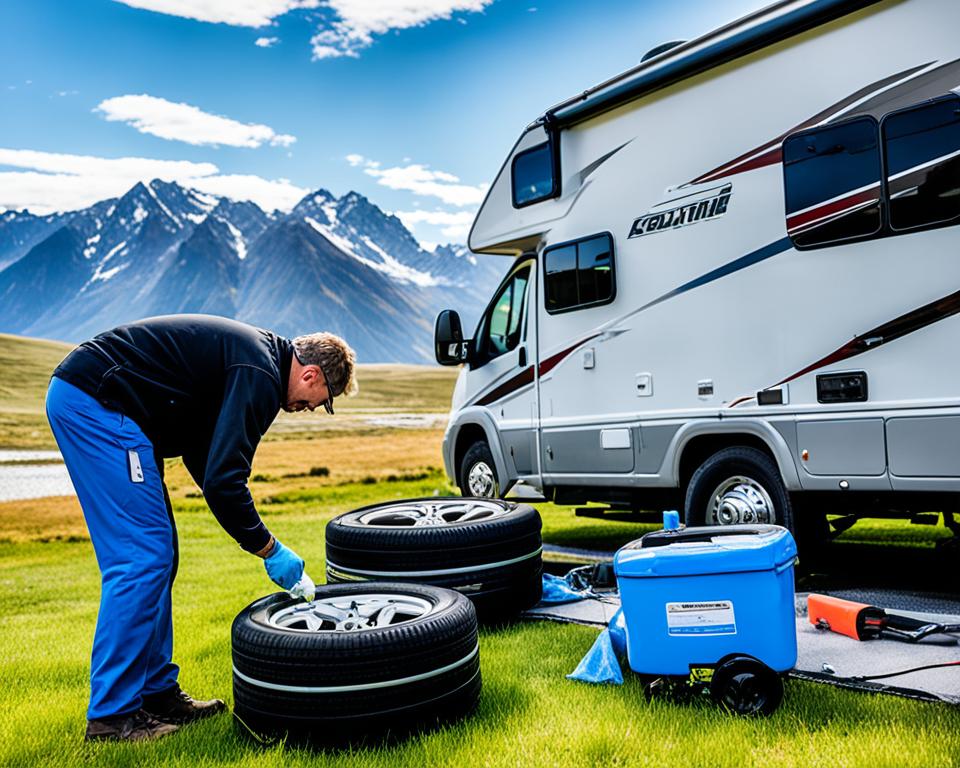
Maintenance Tips for Travel Trailers
When it comes to maintaining your travel trailer, there are specific tasks that you need to prioritize. From roof maintenance to tire care, taking the time to properly maintain your travel trailer can extend its lifespan and ensure a smooth and enjoyable journey. Here are some essential maintenance tips to keep in mind:
1. Travel Trailer Roof Maintenance
Keeping your travel trailer’s roof in good condition is crucial to prevent leaks and water damage. Regularly inspect the roof for cracks, tears, or any signs of wear and tear. Clean the roof using a gentle soap or specialized RV roof cleaner, and avoid using abrasive materials that could damage the surface. Apply a protective coating or sealant to maintain the integrity of the roof and prevent future damage. Remember to also check and clean the gutters and downspouts to ensure proper water drainage.
2. Travel Trailer Tire Maintenance
Proper tire maintenance is vital for safe travels with your travel trailer. Regularly inspect the tires for any signs of wear, including uneven tread wear or bulges. Check the tire pressure regularly, especially before long trips, and maintain the recommended pressure according to the manufacturer’s specifications. Don’t forget to inspect the spare tire as well. Additionally, rotate the tires periodically to ensure even wear and prolong their lifespan.
3. Exterior Cleaning and Maintenance
Keeping the exterior of your travel trailer clean and well-maintained not only enhances its appearance but also prevents damage caused by dirt, grime, and environmental elements. Regularly wash the exterior using a mild soap and water solution or a specialized RV cleaner. Pay attention to areas prone to dirt buildup, such as the undercarriage, wheel wells, and awnings. Inspect the exterior for any signs of damage or loose screws, and repair or replace them promptly to prevent further issues.
4. Interior Maintenance
Maintaining the interior of your travel trailer is equally important for a comfortable and enjoyable trip. Clean the interior regularly using appropriate cleaners for different surfaces, such as upholstery, countertops, and floors. Inspect and maintain appliances, including the refrigerator, stove, and water heater, following the manufacturer’s instructions. Check for any signs of leaks, mold, or pests, and address them immediately to prevent further damage.
5. Electrical and Plumbing Checks
Regularly inspecting the electrical and plumbing systems in your travel trailer is essential to ensure everything is in proper working order. Check the electrical connections, outlets, and wiring for any signs of damage or loose connections. Test the lights, fans, and other electrical components to ensure they are functioning correctly. When it comes to plumbing, inspect for leaks, check the water pressure, and clean or replace filters as needed. Properly winterize the plumbing system if you live in a cold climate to prevent freezing and potential damage.
6. Propane System Maintenance
If your travel trailer has a propane system, it’s crucial to ensure its proper maintenance and safety. Inspect the propane tanks for any signs of damage or leaks. Check the connections, hoses, and regulators for wear and tear, and replace them as necessary. Test the propane appliances, such as the stove and heater, to ensure they are functioning correctly. Familiarize yourself with the proper usage and safety guidelines for propane systems to prevent accidents or hazardous situations.
7. Regular Inspections and Checklists
Creating a regular inspection and maintenance checklist for your travel trailer can help you stay organized and ensure no essential tasks are overlooked. Include all the necessary maintenance tasks specific to your trailer, such as checking the brakes, bearings, and suspension, inspecting the awning for tears or damage, and testing the electrical and HVAC systems. Regularly refer to your checklist and perform the necessary maintenance tasks at the recommended intervals to keep your travel trailer in optimal condition.
| Maintenance Task | Frequency |
|---|---|
| Roof inspection and cleaning | At least twice a year |
| Tire inspection and rotation | Every 5,000-7,000 miles |
| Exterior washing | As needed, at least once a month |
| Interior cleaning | As needed, at least once a month |
| Electrical and plumbing checks | Every 3-6 months |
| Propane system inspection | Annually |
| Regular inspections and checklists | Ongoing, at least once a month |
By following these travel trailer maintenance tips, you can ensure that your trailer stays in great condition for all your future adventures. Regular maintenance not only extends the lifespan of your travel trailer but also enhances your overall travel experience.
Maintenance Tips for Pop-up Campers
Pop-up campers require specialized maintenance due to their unique design. In this section, we will provide you with maintenance tips specifically for pop-up campers. We will cover topics such as roof maintenance, awning care, and other important tasks to keep your pop-up camper in great condition.
Pop-up Camper Roof Maintenance
The roof of your pop-up camper is one of its most critical components. Regular roof maintenance will help prevent leaks, water damage, and costly repairs. Follow these maintenance tips to keep your pop-up camper roof in excellent condition:
- Inspect the roof for any signs of cracks, tears, or damage. If you notice any issues, repair them promptly to prevent water from seeping in.
- Clean the roof regularly with mild soap and water. Avoid using harsh chemicals that can damage the roof material.
- Check the roof seals and caulking around vents, skylights, and other openings. Replace any damaged or deteriorated seals to maintain a watertight seal.
- Remove any debris, leaves, or branches that may accumulate on the roof. This will prevent clogs in the gutters and drainage system.
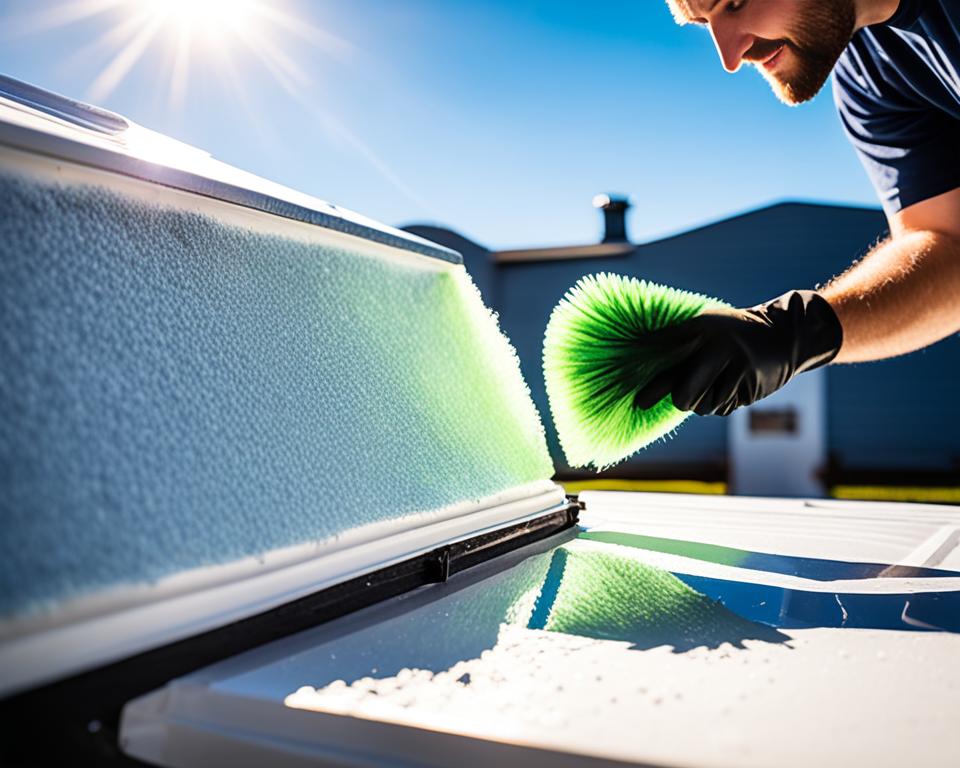
Pop-up Camper Awning Maintenance
The awning on your pop-up camper provides shade, protection, and extra living space. Proper maintenance will ensure its longevity and functionality. Follow these tips to maintain your pop-up camper awning:
- Clean the awning fabric regularly with a mild soap solution and a soft brush. Rinse thoroughly and allow it to dry completely before retracting.
- Inspect the awning hardware for any signs of rust or damage. Lubricate moving parts with silicone spray to prevent sticking.
- Secure the awning properly when not in use or during windy conditions. This will prevent damage from strong winds and extend the lifespan of the awning.
- Check the awning fabric for any tears or holes. Repair them promptly using an awning repair tape or patch kit to prevent further damage.
| Maintenance Task | Frequency |
|---|---|
| Inspect the roof for damage | Every 3 months |
| Clean the roof | Twice a year |
| Check roof seals and caulking | Every 6 months |
| Remove debris from the roof | As needed |
| Clean the awning fabric | Once a month |
| Inspect awning hardware | Every 3 months |
| Secure the awning | When not in use or during windy conditions |
| Repair awning tears or holes | As soon as possible |
By following these maintenance tips for your pop-up camper, you can ensure that it stays in excellent condition and provides you with many memorable camping adventures.
Checklist for Annual RV Maintenance
Annual maintenance is crucial for the long-term health of your RV. To ensure that your vehicle remains in top shape, it’s important to have a comprehensive checklist for annual RV maintenance. This checklist will guide you through the necessary tasks, including winterization, inspections, and repairs. By following this checklist, you can keep your RV in optimal condition and avoid costly issues down the road.
Annual RV Maintenance Tasks:
- Inspect the roof for any damage or signs of wear. Check for leaks and clean the roof thoroughly.
- Examine the exterior for any cracks, dents, or corrosion. Repair or replace any damaged parts.
- Service the RV’s batteries, including cleaning the terminals and checking the water levels.
- Test all electrical systems, including lights, appliances, and outlets. Replace any faulty components.
- Inspect the plumbing system for leaks or blockages. Check the water heater and water pump.
- Check the tires for proper inflation, tread wear, and signs of damage. Rotate and replace tires as needed.
- Perform routine maintenance on the engine, including oil changes, filter replacements, and fluid checks.
- Inspect and clean the RV’s HVAC system, ensuring proper ventilation and air circulation.
- Test and maintain all safety devices, such as smoke detectors, carbon monoxide detectors, and fire extinguishers.
Additionally, it’s important to follow an RV winterization checklist to protect your vehicle from freezing temperatures. This checklist typically includes draining the water system, adding antifreeze, and insulating exposed pipes and tanks. Winterization helps prevent costly damage caused by freezing temperatures.
| Task | Frequency |
|---|---|
| Inspect roof | Annually |
| Examine exterior | Annually |
| Service batteries | Annually |
| Test electrical systems | Annually |
| Inspect plumbing system | Annually |
| Check tires | Annually |
| Perform engine maintenance | Annually |
| Inspect HVAC system | Annually |
| Maintain safety devices | Annually |
By following this checklist for annual RV maintenance, you can ensure that your vehicle is properly cared for and ready for all your future adventures.
Schedule for RV Maintenance
Creating a regular maintenance schedule is essential to stay on top of RV maintenance tasks and ensure the longevity of your vehicle. By proactively addressing maintenance needs, you can prevent costly breakdowns and keep your RV in optimal condition. In this section, we will guide you on how to create a schedule for RV maintenance, including recommendations for the frequency of routine tasks.
Determining Routine RV Maintenance Tasks
Before establishing a maintenance schedule, it’s important to identify the routine tasks necessary to keep your RV in good shape. These tasks may vary depending on the type of RV, its components, and usage patterns. Here are some common routine RV maintenance tasks:
- Inspecting and cleaning the exterior, including the roof, windows, and awnings
- Checking and replacing air filters
- Inspecting and servicing the generator
- Monitoring tire pressure and tread depth
- Checking and topping up fluids, such as engine oil, coolant, and transmission fluid
- Testing and maintaining the RV’s electrical system
- Inspecting and servicing the brakes
- Cleaning and maintaining the interior, including upholstery and appliances
Establishing a Maintenance Schedule
Once you have identified the routine maintenance tasks for your RV, it’s time to create a schedule that works for you. Consider the following factors:
- Manufacturer Recommendations: Consult your RV’s owner’s manual to determine the manufacturer’s recommended maintenance schedule. This will provide you with a baseline for essential tasks that should be performed regularly.
- Usage Frequency: Consider how often you use your RV. Is it a full-time residence or primarily used for vacations? The more frequently you use your RV, the more frequently you may need to perform maintenance tasks.
- Seasonal Considerations: Some maintenance tasks, such as winterization or preparing for the summer season, require specific attention during certain times of the year. Incorporate these seasonal tasks into your schedule accordingly.
Based on these factors, create a calendar or spreadsheet to outline your maintenance tasks and their corresponding frequencies. This will serve as a visual reminder and ensure you stay organized with your RV maintenance routine.
Sample RV Maintenance Schedule
Below is a sample maintenance schedule to help you get started. Remember, this schedule may vary depending on your RV’s specifics, so it’s essential to consult your owner’s manual and adjust accordingly.
| Task | Frequency |
|---|---|
| Exterior Inspection and Cleaning | Monthly |
| Air Filter Check and Replacement | Every 6 months |
| Generator Servicing | Annually |
| Tire Pressure and Tread Check | Before every trip |
| Fluid Check and Top-up | Every 3 months |
| Electrical System Inspection | Annually |
| Brake Inspection and Servicing | Annually |
| Interior Cleaning and Maintenance | Monthly |
Use this sample schedule as a starting point, but remember to adapt it to your RV’s specific needs and consult your owner’s manual for any manufacturer recommendations.
By following a well-planned maintenance schedule, you can stay on top of routine RV maintenance tasks and ensure the longevity and reliability of your vehicle.
Average Costs for RV Maintenance
When it comes to owning an RV, it’s important to consider the costs associated with maintenance and repairs. By understanding the average expenses involved, you can effectively budget and plan for the upkeep of your recreational vehicle. In this section, we will provide you with an overview of the costs you can expect to incur.
RV maintenance costs can vary depending on several factors, such as the age and condition of your RV, the type of maintenance required, and whether you choose to perform the tasks yourself or hire professionals. On average, RV owners can expect to spend between $500 and $1,500 per year on maintenance expenses.
The average RV maintenance expenses can be broken down into the following categories:
- Regular Maintenance: This includes routine tasks such as oil changes, filter replacements, tire rotations, and general inspections. The costs for regular maintenance can range from $200 to $500 per year.
- Appliance and System Repairs: RVs are equipped with various appliances and systems, including refrigerators, air conditioning units, generators, and plumbing systems. Repairing or replacing these components can cost anywhere from $100 to $1,000 per incident, depending on the severity of the issue.
- Body and Exterior Repairs: Accidents happen, and damage to the body and exterior of your RV may require repairs. Costs for bodywork and exterior repairs can range from $500 to $5,000 or more, depending on the extent of the damage.
It’s worth noting that these are just average costs, and your actual expenses may vary. Additionally, unexpected repairs and maintenance needs can arise, further increasing your overall expenses. However, by staying proactive with routine maintenance tasks, you can mitigate the risk of costly repairs in the long run.
Professional Repairs vs. DIY
When it comes to RV maintenance and repairs, you have the option to either tackle the tasks yourself or hire professionals. While DIY repairs may save you money on labor costs, it’s important to consider your skill level and expertise. Mistakes made during DIY repairs can end up costing you more in the long run if they result in further damage.
On the other hand, professional repairs may come at a higher price, but they often come with quality workmanship and warranties. Hiring professionals can provide peace of mind knowing that your RV is in capable hands, especially for more intricate repairs and maintenance tasks.
Conclusion
Maintaining your RV generator is crucial for its longevity and optimal performance. By implementing the best RV generator maintenance practices discussed in this article, you can ensure that your generator remains in top shape. Incorporating these essential RV generator maintenance tips into your routine maintenance schedule will help you enjoy worry-free adventures with your RV.
FAQ
What are some essential tips for RV generator maintenance?
Some essential tips for RV generator maintenance include regular oil and filter changes, routine inspections for leaks or damage, keeping the generator clean and free of debris, and running the generator regularly to prevent fuel system issues.
How often should I perform maintenance on my RV generator?
The frequency of RV generator maintenance depends on factors such as usage and manufacturer recommendations. It is generally recommended to perform routine maintenance tasks, such as oil and filter changes, every 100 to 150 hours of generator operation or at least once a year.
What are the common signs that my RV generator needs maintenance or repairs?
Common signs that your RV generator needs maintenance or repairs include difficulty starting, excessive noise or vibration, decreased power output, fuel leaks, and unusual smells or exhaust fumes. If you notice any of these signs, it is important to address the issue promptly.
Can I perform RV generator maintenance myself, or should I hire a professional?
Many RV owners choose to perform basic routine maintenance tasks on their own, such as oil and filter changes. However, more complex repairs or troubleshooting should be handled by a qualified professional to ensure the safety and proper functioning of the generator.
How can I extend the lifespan of my RV generator?
To extend the lifespan of your RV generator, it is important to perform regular maintenance, follow the manufacturer’s recommendations, keep the generator clean and free of debris, and run the generator regularly to prevent fuel system issues. Additionally, using clean and high-quality fuel and conducting routine inspections can help identify and address potential problems early on.
How do I properly store my RV generator when it is not in use?
When storing your RV generator, it is important to follow the manufacturer’s guidelines. Generally, you should run the generator with a full load for 30 minutes before shutting it down. Ensure that the fuel system is properly treated with a fuel stabilizer, and store the generator in a cool and dry location.
Are there any specific safety precautions I should take when performing maintenance on my RV generator?
Yes, when performing maintenance on your RV generator, it is important to take safety precautions to prevent accidents or injuries. This includes turning off the generator and disconnecting the power source, allowing the generator to cool down before performing any maintenance tasks, and following all safety guidelines and instructions outlined in the generator’s manual.

